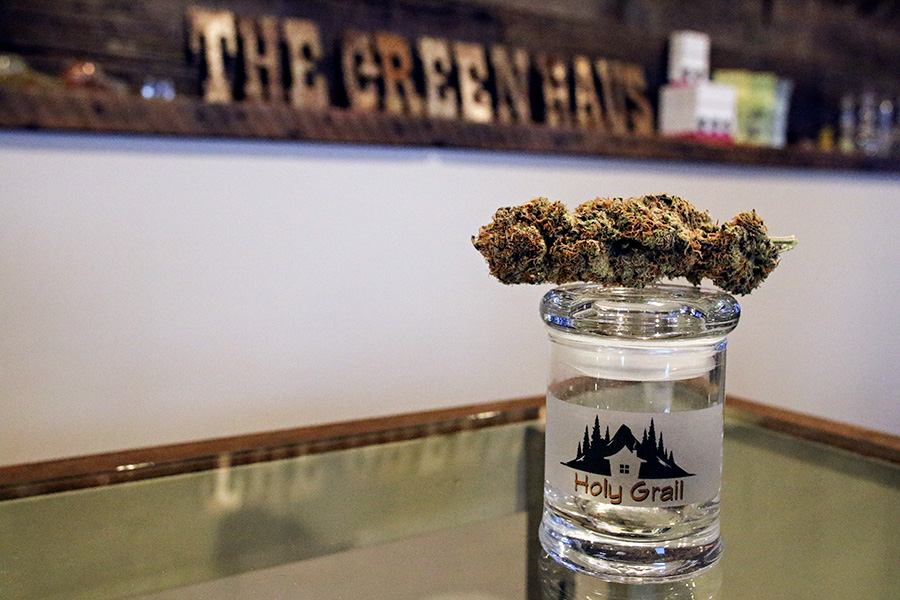Medical Marijuana Dispensaries Remain Wary of Federal Action
With U.S. Attorney Jeff Sessions’ latest action rescinding an Obama-era memo giving protection to cannabis enterprises, Montana businesses say banking could be a problem
By Molly Priddy
EVERGREEN – The Green Haus medical marijuana dispensary is a bright, airy space with wooden accents and friendly faces behind the counter, a dream owner Mike Eacker has spent at least a decade making come true.
Each customer who walks in is greeted by name, and each tells stories of how medical cannabis has changed their lives for the better. But Eacker, like more than 600 other medical marijuana providers in Montana, knows the path forward is far from smooth.
Just getting into this building was a challenge, he said. When medical marijuana was first legalized in Montana, Eacker set up shop but was eventually shut out of his property lease after a federal crackdown on local cannabis operations in 2009.
“I was turned down for leases for six years,” said Green Haus Manager Dan Simonson.
“We actually ended up purchasing our building,” Eacker added.
And last month, Eacker received word from a local bank with which he has done business for the Green Haus for years that his accounts would no longer be accepted there. Eacker said recent rumblings at the federal level have likely cooled most financial institutions to the idea of financing medical marijuana businesses.
Despite states legalizing weed entirely or at a medical level, the federal government still considers marijuana a Schedule I drug. In 2013, then-President Barack Obama issued the Cole Memorandum, which largely told federal law enforcement to allow legal businesses to keep operating, and also opened up the possibility of banks working with marijuana businesses as long as they complied with federal guidelines.
But earlier this month, U.S. Attorney General Jeff Sessions rescinded the Cole Memo, which those in the cannabis industry say could have a chilling effect on banking.
“The Cole Memo was tied in considerably with the federal banking guidelines for states that have some form of legal access,” said Kate Cholewa, who works in government relations for the Montana Cannabis Industry Association. “There is concern about that, and that’s important as our state has just begun collecting taxes.”
Montana medical marijuana providers paid a 4 percent tax on their gross sales receipts for the first quarter in 2017, a tax created by the 2017 state Legislature which will fall to 2 percent in July 2018.
Four-hundred-thirty-four providers paid $395,251 in taxes for the first quarter, which ended in September, according to Mary Ann Dunwell, public information officer for the Montana Department of Revenue. Of that total, 15 percent was paid in cash, and the rest went to the state electronically or via check. The average payment was $800, Dunwell said, but several providers paid more than $10,000.
Eacker said it didn’t make sense that his business can’t deposit medical marijuana cash into a checking account when the state government can deposit those taxes into accounts.
“We can’t bank and we can’t obtain financing,” Eacker said.
Jan. 17 was the deadline for the second quarter, and as of last week, the Revenue Department collected about $100,000 less than at the deadline of the first quarter. As of last week, 189 providers paid $207,000 in taxes, Dunwell said, and the Revenue Department was at a loss as to why the numbers are lower than the first quarter.
The state Department of Justice doesn’t have plans to change up how it treats medical marijuana businesses, according to a statement from the department.
“Attorney General Sessions’ decision does not change how the Montana Department of Justice enforces the law. It does not affect our treatment of Montana’s medical marijuana program,” the statement said. “We will continue working with local law enforcement agencies to enforce Montana laws governing marijuana. Sessions’ action is a directive to federal officials, primarily the U.S. Attorney’s office.”
Cholewa of the MTCIA said Montana dispensaries should continue to follow state law, “and follow it closely.”
“There’s never been any guarantees for those who are providing the service of medical marijuana,” Cholewa said. “Protection by a memo was pretty thin anyway.”
Rescinding the Cole Memo could lead to federal legislation on marijuana, Cholewa said.
“There does seem to be a sense from most of the states and even in Congress that this was not necessarily well received,” she said.
Eacker at the Green Haus said the shifting topography of running a medical cannabis business in Montana has led other providers heading to other states to ply their trade.
Despite the challenge, he has no plans on leaving.
“I’m born and raised here, this is my home,” Eacker said. “I’ll ride it out however it goes.”